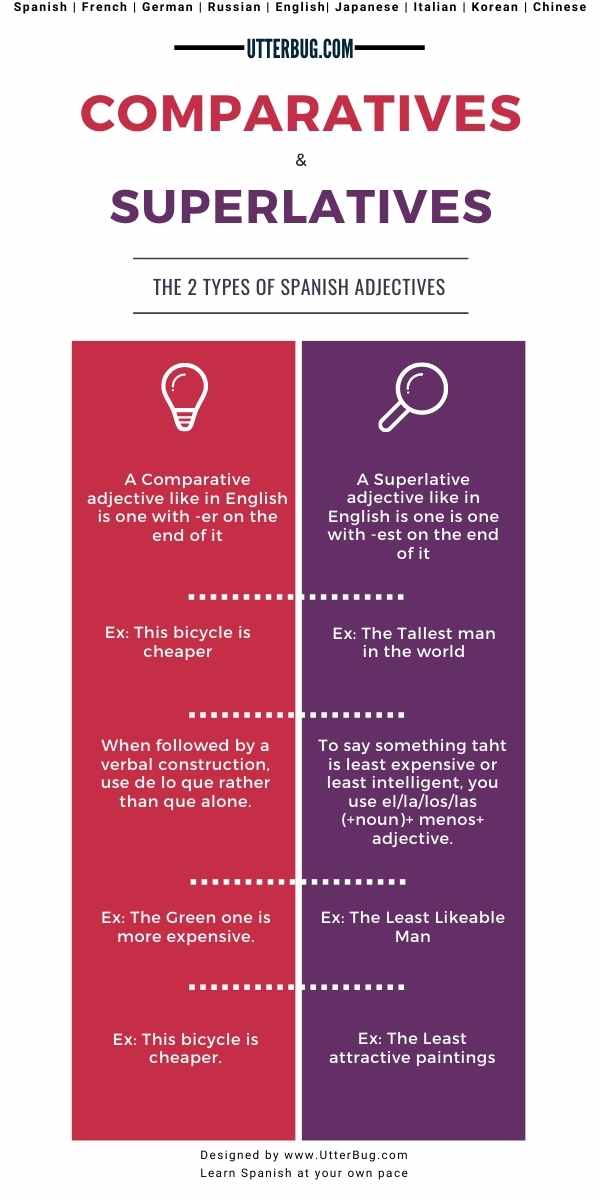

Comparative Adjective DefinitionA comparative adjective in English is one with -er on the end of it or more or less in front of it, that is used to compare people or things, for example, cleverer, les important, more beautiful. |
Grammar! | |
| When than in English is followed by a verbal construction , use de lo que rather than que alone. | |
| She is more tired than she seems. | Esta mas cansada de lo que parece. |

| In Spanish, to say something is cheaper, more expensive and so on, you use mas (meaning more) before the adjective. | |
| This bicycle is cheaper. | Esta bicicleta es mas barata. |
| The Green one is more expensive. | La verde es mas cara. |

Superlative Adjective DefinitionA superlative adjective in English is one is one with -est on the end of it or most or least in front of it, that is used to compare people or things, for example, thinnest, most beautiful, least interesting. |
| Tip: In phrases like the cleverest girl in the school and the tallest man in the world, you use de to translate in. | |
| The Tallest man in the world | el hombre mas alto del mundo |

| To say something is the least expensive, the least intelligent and so on, you use el/la/los/las (+noun)+ menos+ adjective. | |
| The Least Likeable Man | el hombre menos simpatico |
| The Least talkative Girl | la nina menos habladora |
| The Least attractive paintings | los cuadros menos bonitos |
| The Least Hardworking (female) employees | las empleadas menos trabajadoras |
| Who's The Least Hardworking? | Quien es el menos trabajador? |
Tip In phrases like the cleverest girl in the school and the tallest man in the world, you use de to translate in. |
| The tallest man in the world | el hombre mas alto del mundo |

Just as English has some irregular comparative and superlative forms - better instead of ‘more good’, and worst instead of ‘most bad' - Spanish also has a few irregular forms.
| Adjective | Meaning |
| Bueno | good |
| malo | bad |
| grande | big |
| pequeno | small |
| Comparative | Meaning |
| mejor | Better |
| peor | worse |
| mayor | older |
| menor | Younger |
| Superlative | Meaning |
| el mejor | The Best |
| el peor | The Worst |
| el mayor | The oldest |
| el menor | The Youngest |
Note that mejor, peor, mayor and menor don't change their endings in the feminine. In the plural, they become mejores, peores, mayores and menores. Don't forget to use el, la los or las as appropriate, depending on whether the person or thing described is masculine or feminine, singular or plural.
Tip mas grande and mas pequeno are used mainly to talk about the actual size of something. | |
| Este plato es mas grande que aquel. | This plate is bigger than that one. |
| Mi casa es mas pequena que la tuya. | My house is smaller |
| mayor and menor are used mainly to talk about age. | |
| mis hermanos mayores | My older Brothers |
| la hija menor | The Youngest Daughter |

| You use tanto with a noun rather than tan with an adjective in some expressions This because in Spanish you would use a noun where in English we would use an adjective. | |
| Pablo is as frightened as i am. | Pablo tiene tanto miedo como yo. |
| I'm not as hungry as you are. | Yo no tengo tanta hambre como tu. |
| To make an adjective stronger, you can use muy (meaning very). | |
| This book is very interesting. | Esto libro es muy interesante. |

| For even more emphasis, you can add -isimo ( meaning really, extremely) to the end of an adjective. Take of the final vowel if the adjective already ends in one. For example, delgado (meaning thin) becomes delgadisimo ( meaning really thin). | |
| He's bought himself a really expensive car. | Se ha comprado un coche carisimo. |
| She's looking really thin. | Esta delgadisima |
If you add -isimo, you need to take off any other accent. For example, facil (meaning easy) becomes facilisimo (meaning extremely fast).
| It's really easy to make. | Es facilisimo de hacer. |
| an extremely fast car | un coche rapidisimo |
KEY POINTS
| Coprative adjectives in Spanish are fomed by: | |
| mas + adjective + que | menos + adjective + que |
Superlative adjectives in Spanish are formed by: | |
| el/la/los/+mas + adjective | el/la/los/las + menos + adjective |
There are a few irregular comparative and superlative forms in Spanish. | |
You can use tan… como to say as … as. | |
To make an adjective stronger, use muy. | |

Spanish Comparatives And Superlatives Of Adjectives